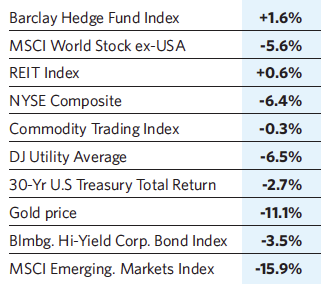Don’t Underrate Defense As A Strategy
Some of us Marylanders like to recall that the Baltimore Ravens won Super Bowl XXXV by 34-7 via one of the most dominant defenses in NFL history. Lesson: Defense can be very rewarding! The following are some of the ways to maintain a risk-reduced posture.
• Moderate equity exposure. Stocks are typically the most price-volatile of the major asset classes, but they are also the most productive class over time. Since no one can really know for sure what lies ahead (c.f. Mark Twain, above), our style is to always own stocks in portfolios, but to scale back our equity exposure when stocks are expensive and increase when they’re a bargain. Stock exposure is currently well below its upper limit in all of our portfolio profiles.
• Emphasize liquidity. If news turns unfriendly, we want a reasonable exit to be possible.
• This is no time to own mutual funds based on broad stock indexes. Rather, focus on the shares of companies with clear competitive advantages. If slow growth turns into no growth, every economic sector will turn intensely competitive—the weak players (which are included in index funds) will lose market share and profit margins will shrink. The most competitive firms will excel by gaining market share.
• Tactical Strategies. Own specialized mutual funds whose style is designed to be productive in weak markets. One example is Vanguard Market Neutral.
• Another defensive category is precious metals. It can attract frightened capital from around the world when the headlines feature terrorism, armed conflicts, currency wars or deflation. Our current position is modest, but that could change.
• Bonds are the classic defensive investment when stocks are in the doldrums. But the tricky aspect of today’s global bond market is that the central bank sponsors of major world currencies have suppressed interest rates dramatically. Some stand accused of cuurency manipulation. In Germany the four-year government bond actually has a negative yield-to-maturity of -0.25%; it makes a four-year U.S. Treasury at 1.5% look downright prodigious! Short-duration, high-quality bonds; a 2% yield from a seven-year U.S. Treasury can put a smile on clients’ faces during a bear market in stocks!
• Emerging markets do capture investor imagination. All that potential for springing from subsistence living to western-style prosperity! A contrary point of view says, “Emerging markets have the best potential in the world, and they always will!” As an asset class, their stocks had a negative total return for the past six years. Some emerging markets are evolving free-market economies, but many are a strange hybrid. Many others depend on China. For now, we think an underweight is prudent.

For Now, A U.S. Emphasis Is Attractive
Complaints about regulation and re-distribution of income are pervasive, but Americans enjoy more freedom, greater market transparency and better information flow than anywhere in the world. People and institutions all over the world with money to invest understand that our culture and our politics—as much as they may drive us nuts sometimes—are fertile ground for risk-taking-innovation, growth and good returns. These explain our envied standard of living. Global investors know it.
One financial trend that may well develop: As the Chinese Communist Party tries to revive its central-planning experiment; as Brazil, with the fifth-largest population in the world, tries to find its way out of a near-depression; as Japan, with the tenth-largest population, struggles to stabilize its currency without shrinking its stagnant economy; as the Middle East searches for a peaceful solution to the ancient rivalries that have heated up dramatically; and as Euroland grapples with its enormous immigration challenges, what might develop is that capital from all over the planet may begin to gravitate to our spacious skies and fruited plains as a sort of safe harbor.
If more money does begin to flow here from elsewhere, an early side effect would be rising prices for U.S. securities, even though both stock and bond valuations are rather high by historical standards.
J. Michael Martin is chairman of FAI Wealth Management, based in Columbia, Md.








